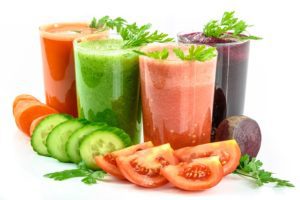DETOX DIET PLAN

If you are looking to improve your general health or have a specific health condition that you want to support, starting a detox diet plan may be helpful for you. Detox diets can take many shapes and forms, ranging from increased gentle physical activity while drinking more water and eating more whole foods to a program of formulated meals, herbal medicines, and/or nutritional supplements.
Many doctors and dieticians, including The Mayo Clinic, consider doing detox diets unnecessary, as the body is actually processing and detoxifying every single day. But in modern life, we are dealing with a regular onslaught of chemicals and pollutants never before experienced in human history. For more info on what detox diet plan will be best for you, talk with your doctor, nutritionist, or naturopath.
Health Benefits From A Detox Diet Plan:
Better Energy
Many people report improved energy levels following a detox diet, and this is often the main reason people begin on a detox diet plan in the first place. While there are still skeptics from both the lay and the medical community, there are, in fact, multiple studies that show short-term fasting protocols have significant benefits for memory, cognition, and energy levels.
According to doctors from Kagoshima University in Japan, at least one patient is known to have completely cured their chronic fatigue syndrome of a combination of cognitive-behavioral therapy and a fasting detox. Following the fasting, various aspects of their white blood cells increased, showing that the benefits of the fasting therapy on their health were both noticeable to the patient and measurable by the doctor’s blood tests.
Liver Cleanse
Whether in the city or the country, modern-day life is filled with chemicals and toxins. Many chemicals, including heavy metals, hormones, pesticides, and plastics, are easily absorbed into fatty tissues and can stay in the body for years. Detoxification diets support the body and its ability to chelate and remove dangerous toxins. Detox diets also serve as a liver cleanse if you are on prescription medication. While many people take medications to support their health and well-being, many drugs are toxic to both the liver and kidneys.
In an article published in Toxicology and Applied Pharmacology in 2005, Kevin Park et al. states: “drug-induced liver injury is the most frequent reason for the withdrawal of an approved drug from the market, and it also accounts for up to 50% of cases of acute liver failure.” Talk to your doctor to find out if your medication is the kind that may cause liver or kidney damage. If so, a regular detox program with liver-protecting herbs (milk thistle, turmeric, bupleurum, spirulina, etc.) may help to protect your liver function in the long term.
Weight Loss
The number one reason for people to explore detox diets and a colon cleanse is the pursuit of weight loss. Most detox programs and diets recommend a general reduction in alcohol, coffee, sugar, processed foods, and an increase in whole foods, including fruits, vegetables, nuts, and seeds. This alone can account for any weight loss experienced during detoxification.

Some studies suggest that extra detox protocol, such as vegetable juicing, may provide extra benefit. In 2010 scientists from The University of California discovered that people suffering from Metabolic Syndrome given vegetable juices every day for 12 weeks experienced a significant weight reduction and increased vitamin C and potassium levels.
While the study does not specify the vegetables used in the juicing, common juicing ingredients include tomatoes, celery, beetroots, cucumbers, carrots, apples, herbs, and spices.
Better Digestion
Many detox diets improve fiber intake and target the liver and gallbladder to produce more bile, which is the body’s natural laxative. For anyone suffering constipation, diarrhea, heartburn, flatulence, or irritable bowel syndrome (IBS), going on a detox diet plan often brings great relief with some prolonged benefit.
In a study published by The University of Reading in the U. K. in 2004, scientists discovered that a herbal medicine commonly used in detox diets — globe artichoke leaf effectively improves digestion in patients with IBS.

Globe artichoke leaf is known from previous studies to stimulate liver detoxification, bile secretion and improve gut motility. Often it is used as a liver tonic or during a colon cleanse. In this research, patients with IBS experienced improvements in their constipation, diarrhea, stomach pain and reported a 20% improvement in overall quality of life following their use of globe artichoke leaf.
Skin Clearing
Naturopaths and herbalists have long recommended detoxification programs and diets for anyone with inflamed, sensitive, or itchy skin. While the liver, colon, and kidneys perform most of the detoxification of the body, the lungs and the skin are considered minor detoxification organs.
Skin performs less than 5% of the total detoxification of the body, mostly through perspiration. When the sweat is filled with toxins, it is believed to trigger inflammatory skin conditions and increase body odor.
While more research is needed to understand this process, some studies have linked the use of detox herbs to improved skin health.
Researchers from San Gallicano Dermatological Institute in Italy published findings in The Journal of Cosmetic Dermatology in 2008 that showed people suffering from rosacea given the combination of silymarin (a botanical compound known to stimulate liver detoxification) and MSM (a supplemental form of the mineral sulfur) experienced a significant improvement in their symptoms. Skin color, inflammation, heat, hydration, and itching all improved.
Also, look at my article, protein shake for weight loss which can be part of your detox diet plan.
